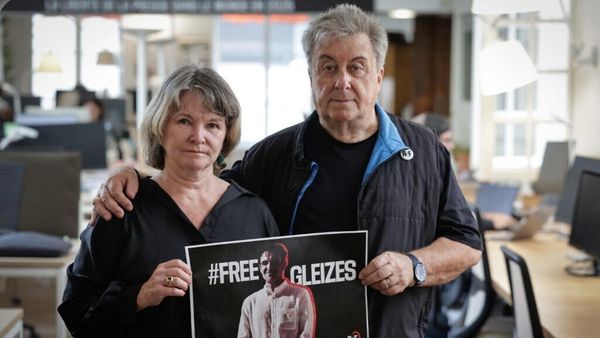
Photograph: Hilary Wardhaugh/The Guardian
Suzanne was having enough trouble making ends meet when a modest tax debt she had been paying off was referred to an external collector.
On 15 April, the Australian Taxation Office-appointed debt collector, Recoveriescorp, gave her one week to pay $2,590.33, or risk further recovery action, which it said included possible legal proceedings.
Suzanne, whose commission-based work dried up early in the pandemic, says the demands letter sent her into a state of panic.
“I didn’t have the money nor could I raise it given I’d sold everything close to that value to pay living expenses; only my car was over that amount,” says Suzanne, who asked for her surname not to be published.
The 55-year-old was receiving unemployment benefits at the time, and had reported hardship to ATO staff on several occasions.
The vehicle, a Holden Captiva, was broken down, and even if she could sell it quickly, would have required money to fix it first to raise the necessary funds.
Sign up: AU Breaking News email
Suzanne says she was in a “cycle of financial catchup”, and she was “struggling to meet essential living costs, and the ongoing financial stress took a significant toll on my mental health”.
Guardian Australia can reveal that Suzanne is one of more than 355,000 taxpayers the ATO has referred to the private equity-backed debt collector, Recoveriescorp, since January 2024.
The ATO started using Recoveriescorp, which is housed in an investment fund run by investment group Allegro, after tax debts escalated early in the pandemic years when the revenue collection agency was told by the government to be lenient due to the market turmoil.
Suzanne’s account raises questions over the ATO’s use of a private debt collector, and its approach, which rubs against a public pledge by Recoveriescorp to “support people towards sustainable financial outcomes through respectful and practical solutions”.
An Allegro spokesperson said it was not authorised to comment due to contractual obligations.
Debt demand
Suzanne’s original debt is linked to missed quarterly pay-as-you-go (PAYG) amounts early in the pandemic, according to documents viewed by Guardian Australia, whereby the ATO requires a taxpayer to make prepayments on an anticipated tax debt.
But her income had dropped significantly by the time she was added to the quarterly system, which almost certainly meant the prepayments were not necessary.
Despite this, Suzanne started a weekly ATO payment plan of about $46 a week to pay off the debt from 2023 that she continues to make.
The overall debt has kept growing, even after the weekly payments, because Suzanne was kept on the PAYG system until recently, whereby about $900 was added to her arrears every three months.
Amid the financial strain, she has fallen behind on her tax returns.
Suzanne started receiving Centrelink support last year. For reasons that were not made clear, some of her benefits were withheld, exacerbating her financial distress.
ATO staff were alerted to Suzanne’s hardship circumstance on several occasions that should have prompted them to cancel the PAYG payments, and reassess the repayment schedule, documents show.
Instead, she was referred to a debt collector, which is usually reserved for unresponsive taxpayers – not those making weekly repayments.
Recoveriescorp’s April letter said if Suzanne didn’t pay the amount within seven days of the issue date, the ATO may issue a “garnishee” notice, or take legal action.
Suzanne says she has been left distraught by the process.
“Between attempting overwhelming tax returns and collating evidence, it has consumed time I could have spent looking for work instead of trying to correct a debt because if I don’t, collection will force me into further hardship,” she says.
An ATO spokesperson said the agency was unable to comment specifically due to taxpayer confidentiality.
The spokesperson said the ATO is committed to improving interactions with the community, and especially ensuring those experiencing vulnerability receive appropriate assistance.
The ATO representative said external collection agencies (ECAs) provide additional capacity to allow the tax office to engage with more people to address their liabilities.
“ECA providers are contractually committed to the ATO, which includes communicated expectations that are assured through a thorough, professional and documented contract governance process,” the spokesperson said.
The ATO has referred 355,478 taxpayers to Recoveriescorp since January 2024.
The revenue collection agency has consistently said it needed to do more to recoup the roughly $50bn in outstanding collectible debt, which has been described as mostly self-reported by taxpayers.
But its recent collection programs have come under scrutiny for being heavy-handed.
One initiative, dubbed “robotax” due to comparisons to the flawed robodebt compliance program, was designed to clawback more than $15bn before a major plank of that campaign was suspended amid widespread criticism.
Many of the contested debts were decades old and had remained invisible to taxpayers until recently.
Do you know more? Email jonathan.barrett@theguardian.com







